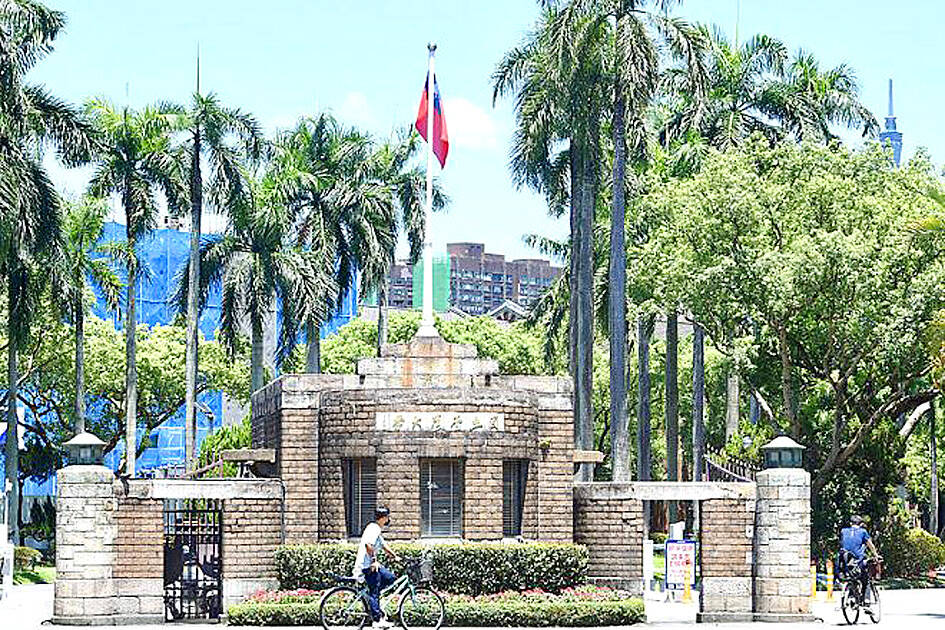National Taiwan University (NTU) and six other schools implemented mental health leave for students in the new semester, increasing the number to 18 schools, 12 percent of universities in the nation, the Ministry of Education (MOE) said.
Students applying for leave do not have to attend classes, and they can have time to deal with their personal issues arising from emotional problems or stress, said MOE Department of Student Affairs and Special Education Director Wu Lin-hui (吳林輝) on Saturday, adding that mental support service for the student must be approved by their universities’ counselors.
Kaohsiung-based National Sun Yat-sen University last year initiated a mental health leave program and became the first university to do so, university president Cheng Ying-yao (鄭英耀) said.

Photo: Lo Pei-de, Taipei Times
The university does not have a limit on how many times an individual can take such leave, but if a student applies more than three times in one semester, a school counselor would step in, Cheng said, adding that there were 662 applications made in the last school year, or 3.83 percent of its students.
Last year, 11 universities initiated such programs, and 29,582 students took mental health leave in the fall and spring semesters, Wu said.
NTU approved the implementation of a mental health leave program this month, along with four other state universities including National Taipei University, National Central University, National Chiayi University and National Pingtung University. Two private universities, Feng Chia University and Chinese Culture University also launched such programs.
NTU students can apply to take mental health leave not more than three times per semester, NTU officials said.
National Central University students can take up to five days of mental health leave per semester, but cannot use such leave to skip an exam.
Taipei Medical University also limits mental health leave with five days per semester, with a student’s adviser or professor being required to take active steps to help the student after three days of mental health leave.
Taiwan Youth Association for Democracy director Alvin Chang (張育萌) said the program provides good support for students, and the limits can prevent the practice from being abused.
A student at NTU College of Law and Politics said that he was feeling down when last semester started, so he applied for mental health leave and it helped him to feel better, and he eventually returned to his classes.
Another student, surnamed Wu (吳), at National Taiwan Normal University said that he got insomnia a while ago and the leave helped him sort out his sleeping problem.
Additional reporting by Jason Pan

POSITIVE DEVELOPMENT: Japan and the US are expected to hold in-depth discussions on Taiwan-related issues during the meeting next month, Japanese sources said The holding of a Japan-US leaders’ meeting ahead of US President Donald Trump’s visit to China is positive news for Taiwan, former Japan-Taiwan Exchange Association representative Hiroyasu Izumi said yesterday. After the Liberal Democratic Party’s landslide victory in Japan’s House of Representatives election, Japanese Prime Minister Sanae Takaichi is scheduled to visit the US next month, where she is to meet with Trump ahead of the US president’s planned visit to China from March 31 to April 2 for a meeting with Chinese President Xi Jinping (習近平). Japan and the US are expected to hold in-depth discussions on Taiwan-related issues during the

‘LIKE-MINDED PARTNER’: Tako van Popta said it would be inappropriate to delay signing the deal with Taiwan because of China, adding he would promote the issue Canadian senators have stressed Taiwan’s importance for international trade and expressed enthusiasm for ensuring the Taiwan-Canada trade cooperation framework agreement is implemented this year. Representative to Canada Harry Tseng (曾厚仁) in an interview with the Central News Agency (CNA) said he was increasingly uneasy about Ottawa’s delays in signing the agreement, especially as Ottawa has warmed toward Beijing. There are “no negotiations left. Not only [is it] initialed, we have three versions of the text ready: English, French and Mandarin,” Tseng said. “That tells you how close we are to the final signature.” Tseng said that he hoped Canadian Prime Minister Mark Carney

President William Lai (賴清德) yesterday bestowed one of Taiwan’s highest honors on Saint Vincent and the Grenadines (SVG) Ambassador Andrea Clare Bowman in recognition of her contributions to bilateral ties. “By conferring the Order of Brilliant Star with Grand Cordon on Ambassador Bowman today, I want to sincerely thank her, on behalf of the Taiwanese people, for her outstanding contribution to deepening diplomatic ties between Taiwan and SVG,” Lai said at a ceremony held at the Presidential Office in Taipei. He noted that Bowman became SVG’s first ambassador to Taiwan in 2019 and

A man walks past elementary school artworks at the Taipei Lantern Festival in Ximen District yesterday, the first day of the event. The festival is to run from 5pm to 10pm through March 15.